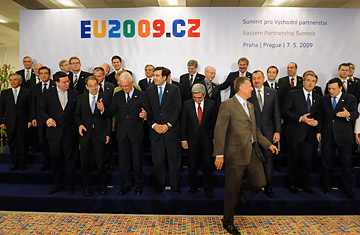
Participants of an EU-Eastern Partnership Summit at the end of the group photo shoot in Prague.
Initially conceived to forge a new relationship between the European Union and six former Soviet republics, the May 7 summit launching the E.U.'s Eastern Partnerships accord wound up more like the first date from hell. Instead of feeling the welcoming embrace the program had promised, representatives from Azerbaijan, Armenia, Belarus, Georgia, Moldova and Ukraine instead got a European straight-arm designed to keep them at a safe distance. Indeed, given the manner in which the courtship has begun, some observers now wonder whether any of the parties involved can ever hope to make beautiful music together.
Of course, it probably didn't help the officials who gathered May 7-8 in Prague that extended families on both sides of the match had already seriously meddled with what had been a pretty simple proposal. An outgrowth of the E.U.'s long-standing European Neighborhood Program (ENP), the Eastern Partnership (EaP) plan called for establishing preferential development, trade, and travel agreements with the six former Soviet republics in exchange for them taking steps to create solid and responsible free market economies and democratic political systems. In that way, the multi-lateral EaP sought to strike up and reinforce ties with the E.U.'s outlying neighbors even faster than the bilateral ENP agreements had. (See pictures of President Obama's travels in Europe.)
But something happened on the way to the EaP's founding summit — namely, the global recession. Many of the countries worst hit by the economic downturn are the same 12 nations that have joined the E.U. since 2004, most from Eastern Europe. Now not only are those post-Cold War newcomers — who used huge inflows of European development aid to build up U.S.-style economies — most in need of more emergency funding to prop up their credit-dependent markets, but they are also viewed as migrant threats to other E.U. nations already facing escalating unemployment. Not surprisingly, such factors have fueled a rise in the sentiment among old E.U. nations that recent eastward enlargement was a mistake.
Given that, European leaders who in 2008 had enthusiastically backed proposing the EaP to the six former Soviet republics began scrambling to lower its scope ahead of its May 7 launch in Prague. Just hours before the gathering, for example, German and Dutch officials pushed to change wording in the official document to refer to the six EaP postulates as "partner countries" rather than "European countries". They similarly struck any language that even remotely hinted at possible E.U. membership for any time in the future, and revised a "long-term goal" previously described as "visa-free travel" by EaP citizens to the E.U. down to more modest "visa liberalization" for certain business people.
Once the document and its objectives had been thoroughly watered down, it was of little wonder that leaders such as France's President Nicolas Sarkozy, Italian premier Silvio Berlusconi, Spanish Prime Minister José Luis Rodríguez Zapatero, and British Prime Minister Gordon Brown all found more productive things to do rather than attend the EaP launch summit. (Watch a TIME video with Gordon Brown.)
But they may have had their doubts about EaP even before that. Fabio Liberti, a European affairs and security expert with the Institute of International and Strategic Relations in Paris, notes that the calls to push the E.U.'s influence eastward was devised by certain member states — above all Poland and Sweden — to counterbalance the Mediterranean Union that Sarkozy initiated last year to reach out to Europe's southern neighbors. Even that, Liberti says, was fueled by France, Italy, Spain and Greece trying to shift the E.U.'s center of gravity back towards the middle of the continent after the fall of the Berlin Wall tipped it east. Such ulterior motives made the EaP ripe for downsizing in the face of growing European resentment over enlargement. (See pictures of the rise and fall of the Berlin Wall.)
"In the end, it became a non-event, because an initiative that corresponded to the very logic and mission of the European Union itself became undermined by a lot of political factors," says Liberti. "Just as people now tend to view E.U. enlargement as a mistake — rather than examine the errors made in managing it — leaders have gotten shy about the Eastern Partnerships over how it might look, rather than what it will do."
Appearances are not always insignificant, however. Moscow has voiced its hostility to EaP, and said it will defend its influence over the six neighboring nations involved. And many E.U. leaders — notably the Russia-friendly Sarkozy, Berlusconi and German Chancellor Angela Merkel — want to avoid provoking an increasingly stroppy Kremlin. Indeed, ever since Russia's August 2008 war with Georgia, E.U. officials have become particularly wary of possibly prodding the Kremlin into similar action by appearing to set up camp with the EaP countries in Russia's backyard. (See pictures of Sarkozy in the U.K.)
However, Liberti notes that efforts to placate Moscow may only go so far — especially given the energy stakes the EaP involves. He says repeated moves by the Kremlin to choke off gas supplies pumped to Europe via the Ukraine have left many E.U. leaders determined to wean themselves off of their Russian gas dependency. For that reason, Liberti says, developing and exporting new energy resources for EaP signatories like Azerbaijan remains high a priority, along with building a new pipeline to Europe via central Asia that bypasses Russia completely.
"Europe is in this schizophrenic mode in which we're trying to create partnerships without creating them too much, and trying to undermine Russian influence without challenging Russia," Liberti notes. "At the same time, Germany and Italy sign long-term bilateral gas contracts with Russia that increase their dependency."
In other words, if the six former Soviet republics came away from the Prague summit disappointed and confused, they aren't alone.
